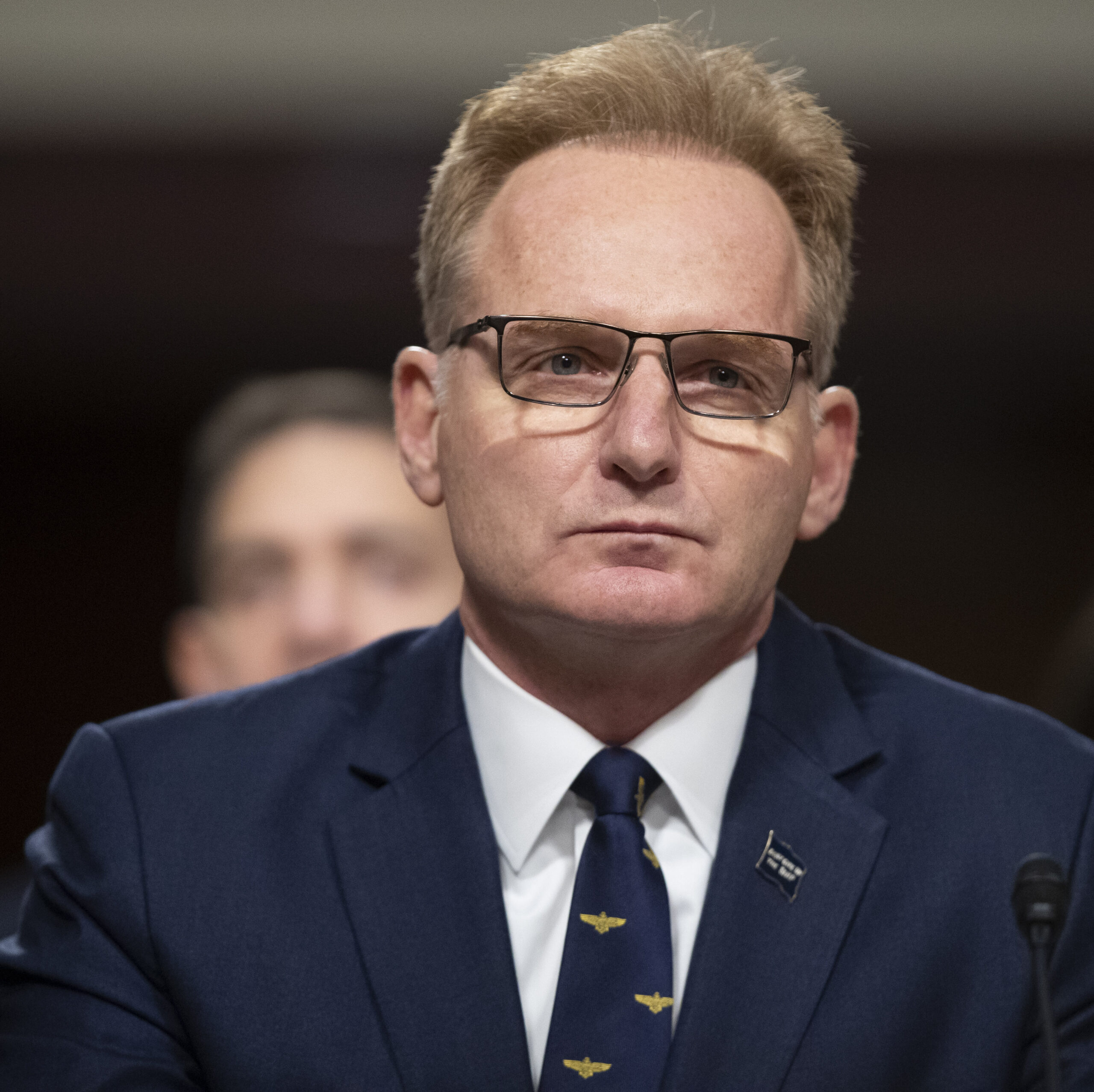A day after U.S. Navy Captain Brett Crozier was abruptly removed from his post as commanding officer of the coronavirus-infected aircraft carrier USS Theodore Roosevelt, a Navy official confirms to NPR that acting Navy Secretary Thomas Modly intends for Crozier to be reassigned rather than dismissed from the Navy.
It was Modly who relieved Crozier of his command on Thursday — a decision the navy secretary insists was his own — two days after an alarmed letter the captain wrote describing the dismal circumstances of his 4,865 crew members sparked a furor after being leaked to the San Francisco Chronicle.
Modly had said Wednesday that the fact that Crozier wrote to his chain of command to express his concerns “would absolutely not result in any type of retaliation,” adding that it was “what we want our commanding officers to be able to do.”
But on Thursday Modly, who was named acting navy secretary after Richard Spencer was forced out as the Navy’s top civilian late last year, said Crozier had shown “poor judgment” by sending his letter by email to up to 30 people, but not to his immediate superior on the warship.
“I could reach no other conclusion than that Capt. Crozier had allowed the complexity of his challenge with the covid outbreak on his ship to overwhelm his ability to act professionally, when acting professionally was what was needed most at the time,” Modly told reporters at the Pentagon. “It creates a panic, and it creates the perception that the Navy is not on the job, the government’s not on the job, and it’s just not true.”
Modly revealed on Friday to Reuters that Crozier is being reassigned rather than discharged. His disclosure followed an outpouring of expressions of support for Crozier and condemnation of his being fired.
A Change.org online petition demanding Crozier’s reinstatement as the Roosevelt’s commanding officer had garnered more than 86,000 signatures by midday Friday.
“Captain Crozier was unjustly relieved of duty,” the petition reads. “His crime was asking for help regarding the safety of his crew when a covid-19 outbreak. His actions possibly saved many lives. Although he was fired, his plan to safely remove crew members was still implemented. He is a hero who should be rewarded.”
Several personal videos of Crozier’s nighttime departure from the aircraft carrier that were posted online show crew members on the deck cheering their sacked commander. He salutes them from the warship’s brow before walking down a gangway alone, a knapsack slung over his shoulder, to a vehicle waiting on the pier.
In one of those videos, a large crowd of crew members applauds the captain and repeatedly chants “Cap-tain! Cro-zier!”
Another video showing his exit from the Roosevelt is accompanied by the message “the whole ship came out to say goodbye to Captain Crozier,” followed by “#crozierforpresident.”
There was also condemnation of Crozier’s removal from former Vice President Joe Biden, President Trump’s likely Democratic challenger in November.
“Donald Trump’s Acting Navy Secretary shot the messenger — a commanding officer who was faithful to both his national security mission and his duty to care for his sailors, and who rightly focused attention on a broader concern about how to maintain military readiness during this pandemic,” Biden said in a statement to Reuters.
“And the Navy sent a chilling message to the rest of the fleet about speaking truth to power,” he said. “The poor judgment here belongs to the Trump Administration, not a courageous officer trying to protect his sailors.”
In a tweet reacting to Crozier’s removal, Rep. Seth Moulton, D-Mass., also had sharp words for the Navy’s leaders.
“I learned on my first day in the Marines that having the courage to speak truth to power is grounds for respect not grounds for relief,” said the former Marine officer and Iraq war veteran who sits on the House Armed Services Committee. “This is far from the first time in the last several years that Congress is going to have a lot of questions for Navy leadership—on leadership.”
A joint statement from four other Democrats on the House Armed Services panel, including Chairman Adam Smith, D-Wash., is somewhat more nuanced. It gives measured support to Modly’s contention that Crozier improperly went outside of the chain of command with his denunciation of dire conditions aboard the Roosevelt.
“Captain Crozier was justifiably concerned about the health and safety of his crew, but he did not handle the immense pressure appropriately,” the committee members write. “However, relieving him of his command is an overreaction.”
“Throwing the commanding officer overboard without a thorough investigation is not going to solve the growing crisis aboard the U.S.S. Theodore Roosevelt,” the lawmakers add. “Dismissing a commanding officer for speaking out on issues critical to the safety of those under their command discourages others from raising similar concerns.”
Modly said Thursday that Adm. Robert Burke, the vice chief of naval operations, will be leading an investigation into the actions that led to Crozier being relieved of his command, as well as an examination of the Pacific fleet’s command climate.
In addition to the approximately 1,000 crew members of the Roosevelt who disembarked at a U.S. naval base in Guam earlier this week, another 2,700 are expected to have left the ship by this weekend to be quarantined in local hotels.
The Guam Daily Post reported Friday that the first 180 of those sailors had been transferred to an oceanside hotel and within 24 hours up to another 500 more would follow.
Expedited removal of the sailors from the virus-infested aircraft carrier to quarantine-worthy quarters was the central demand Crozier made in his leaked letter to his superiors.
Every sailor put in quarantine on the U.S. territory of Guam, where the Roosevelt is docked, will have to have first tested negative for the coronavirus, according to Rear Adm. John Menoni, commander of Joint Region Marianas.
More than 100 crew members have tested positive for coronavirus, a number which Modly predicts could rise to the hundreds as testing of every crew member continues.
Copyright 2020 NPR. To see more, visit https://www.npr.org.
9(MDAxODM0MDY4MDEyMTY4NDA3MzI3YjkzMw004))

9(MDAxODM0MDY4MDEyMTY4NDA3MzI3YjkzMw004))








